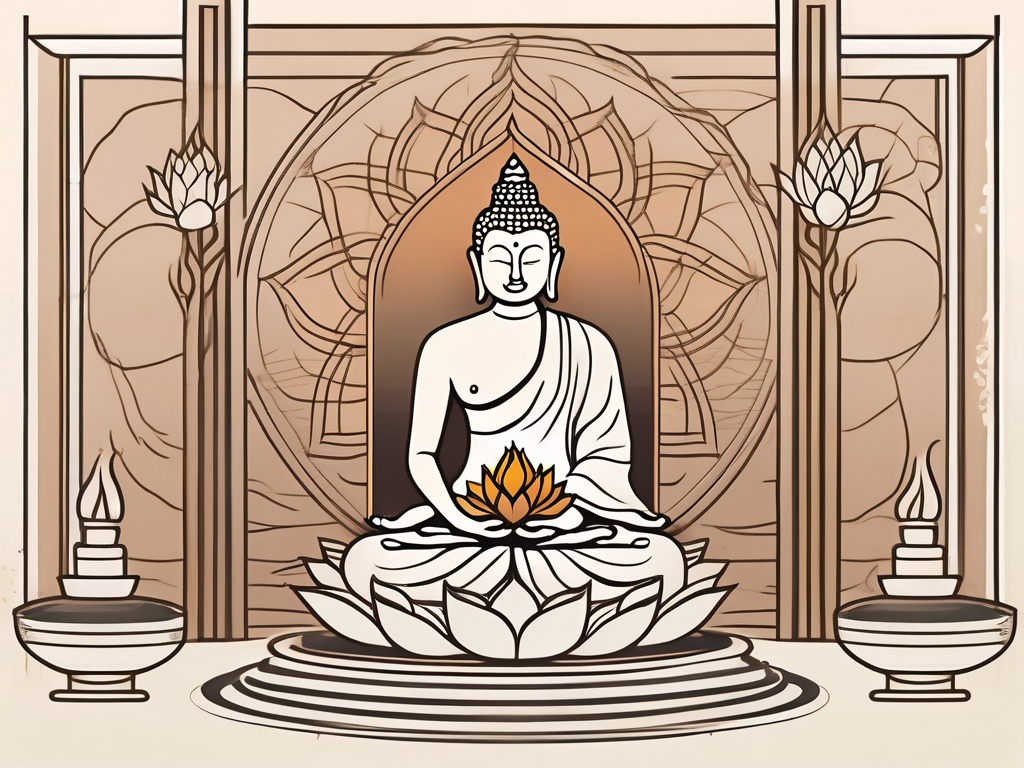Buddhism is a fascinating and complex belief system that has captivated the minds of millions of people around the world. It offers a unique perspective on life, the universe, and everything in between. One of the things that sets Buddhism apart from other religions is what Buddhists do not believe in. This article will explore the core principles of Buddhism, the concept of God, the view on sin and salvation, the perspective on the afterlife, and debunk some common misconceptions.
Understanding the Core Principles of Buddhism
At the heart of Buddhism lie two essential principles: The Four Noble Truths and the Eightfold Path. These teachings form the foundation of Buddhist philosophy, guiding practitioners on their path to enlightenment.
Buddhism, one of the world’s major religions, offers a profound understanding of human existence and the nature of suffering. It provides a roadmap for individuals seeking to find inner peace and liberation from the cycle of birth and death.
The Four Noble Truths
The Four Noble Truths are the cornerstones of Buddhist thought. They address the nature of suffering and how to overcome it. The first noble truth states that suffering exists in the world. It acknowledges the reality of pain, both physical and emotional, that every individual experiences throughout their lives.
However, Buddhism does not dwell solely on the existence of suffering. It goes further by identifying the cause of suffering, which leads to the second noble truth. This truth attributes the cause of suffering to our attachment and desire. It suggests that our cravings and attachments to worldly possessions, relationships, and even our own identities are the root causes of our suffering.
While the second noble truth may seem disheartening, it is followed by the third noble truth, which offers hope. This truth suggests that it is possible to end suffering. Buddhism teaches that through the practice of mindfulness, compassion, and wisdom, individuals can liberate themselves from the cycle of suffering.
Finally, the fourth noble truth presents the Eightfold Path as the way to liberate oneself from suffering. This path, often referred to as the Middle Way, provides a comprehensive guide for leading a virtuous and mindful life.
The Eightfold Path
The Eightfold Path outlines the steps to be taken to achieve enlightenment. It represents a holistic approach to living, encompassing various aspects of human existence. Each step on this path is interconnected and supports the cultivation of wisdom, virtue, and mindfulness.
The first step is right understanding, which involves gaining a deep comprehension of the nature of reality, the impermanence of all things, and the interdependence of all phenomena. It is through this understanding that individuals can begin to free themselves from delusion and ignorance.
Right thought follows, emphasizing the importance of cultivating positive and compassionate thoughts. By redirecting our thinking towards kindness, generosity, and empathy, we create a foundation for virtuous actions.
Right speech encourages individuals to communicate truthfully, kindly, and meaningfully. It emphasizes the power of words and the impact they can have on others. By speaking with mindfulness and compassion, we can create harmony and understanding in our relationships.
Right action extends beyond speech and encompasses ethical conduct. It encourages individuals to act in ways that promote well-being, non-violence, and respect for all living beings. This includes refraining from harming others, stealing, and engaging in harmful sexual behavior.
Right livelihood emphasizes the importance of engaging in work that is ethical and contributes positively to society. It encourages individuals to choose professions that do not cause harm, such as those involved in weapons production, animal exploitation, or unethical business practices.
Right effort emphasizes the importance of exerting oneself in the pursuit of wholesome actions and the abandonment of unwholesome ones. It encourages individuals to cultivate positive qualities such as mindfulness, concentration, and perseverance.
Right mindfulness involves developing a heightened awareness of one’s thoughts, feelings, and bodily sensations in the present moment. It encourages individuals to observe their experiences without judgment or attachment, fostering a deep understanding of the nature of reality.
Finally, right concentration refers to the practice of cultivating focused and undistracted mental states. Through meditation and other concentration techniques, individuals can develop a calm and focused mind, leading to deeper insights and spiritual growth.
By following the Eightfold Path, Buddhists strive to integrate these principles into their daily lives. It is through the consistent practice of these teachings that individuals can gradually transform their minds, develop wisdom, and ultimately achieve enlightenment.
The Concept of God in Buddhism
Unlike many other religions, Buddhism does not revolve around the worship of a divine being or a creator god. However, this does not mean that Buddhism is entirely devoid of spiritual elements.
In Buddhism, the focus is on the individual’s journey towards enlightenment and liberation from suffering. The teachings of the Buddha provide a path for individuals to attain this liberation through self-reflection, mindfulness, and ethical living. While there is no belief in a supreme being guiding this process, Buddhism recognizes the existence of various spiritual realms and beings.
The Role of Deities in Buddhism
While not central to the teachings, Buddhism does acknowledge the existence of deities. However, these deities are not seen as omnipotent or all-knowing. Instead, they are regarded as beings who exist in higher realms and are subject to the same cycles of birth, death, and rebirth as humans.
These deities, known as devas, are seen as having attained a higher level of existence through their past actions and spiritual development. They are not worshipped in the same way as a creator god, but rather respected and revered for their wisdom and compassion. Devotion to these deities is seen as a means to cultivate positive qualities and seek their guidance on the path to enlightenment.
It is important to note that Buddhism does not view these deities as ultimate sources of salvation or liberation. They are seen as fellow beings who, despite their elevated status, are still subject to the cycle of existence and the suffering that accompanies it.
The Absence of a Creator God
In Buddhism, the concept of a creator god is rejected. The belief in an all-powerful deity responsible for the creation of the universe contradicts the Buddhist understanding of causality and the nature of existence. Buddhists place emphasis on personal responsibility and the power of self-transformation.
Instead of relying on a divine being for salvation, Buddhists believe in the power of their own actions and choices. The concept of karma, the law of cause and effect, plays a central role in Buddhism. It teaches that individuals are responsible for the consequences of their actions and that these actions shape their present and future experiences.
By cultivating wholesome intentions, thoughts, and actions, individuals can create positive karma and move closer to liberation from suffering. Buddhism encourages individuals to take ownership of their spiritual journey and develop qualities such as compassion, wisdom, and mindfulness.
While Buddhism does not embrace the concept of a creator god, it offers a profound and transformative path towards self-discovery and liberation. Through its teachings and practices, Buddhism provides individuals with the tools to navigate the complexities of existence and find inner peace.
The Buddhist Perspective on Sin and Salvation
Buddhism offers a unique perspective on the notions of sin and salvation, deviating from the understanding prevalent in many other religions.
When exploring the Buddhist perspective on sin and salvation, it is important to delve into the concept of karma. In Buddhist philosophy, the concept of karma plays a central role. Karma refers to the law of cause and effect, where actions have consequences in this life and future lives. It is a fundamental principle that governs the cycle of rebirth.
Unlike the concept of sin, which is often associated with moral judgment and punishment, karma is viewed as a natural process intertwined with the cycle of rebirth. Every action, whether positive or negative, creates an imprint on one’s consciousness and contributes to the accumulation of karma. This understanding encourages individuals to be mindful of their actions and cultivate positive intentions.
The notion of salvation in Buddhism is closely tied to the path to enlightenment. Rather than seeking liberation from sin, the ultimate goal is to free oneself from the cycle of birth and death and achieve Nirvana. Nirvana is a state of ultimate peace and liberation, where one transcends suffering and attains true enlightenment.
Attaining enlightenment and reaching Nirvana is not a simple task. It requires individuals to follow the Eightfold Path, which consists of right understanding, right thought, right speech, right action, right livelihood, right effort, right mindfulness, and right concentration. These aspects of the path guide practitioners towards a life of moral conduct, mental discipline, and wisdom.
Through the practice of meditation, self-reflection, and ethical living, individuals can gradually purify their minds and transcend the limitations of the ego. This process of self-transformation is the key to liberation and salvation in Buddhism.
It is important to note that Buddhism does not view salvation as an external force or deity that can save individuals from their sins. Instead, it emphasizes personal responsibility and the power of self-transformation. Each individual has the potential to attain enlightenment and liberate themselves from the cycle of suffering.
By understanding the Buddhist perspective on sin and salvation, one can gain a deeper appreciation for the unique teachings and practices of this ancient tradition. Buddhism offers a path towards personal growth, self-discovery, and the ultimate liberation from suffering.
The Buddhist View on Afterlife
Buddhism offers a unique perspective on life after death, focusing on the concepts of reincarnation and Nirvana.
When exploring the Buddhist view on the afterlife, it is important to delve into the profound concepts of reincarnation and Samsara. According to Buddhist belief, after death, individuals are not simply extinguished or sent to a singular destination, but rather, they are reborn into a new existence. This rebirth is determined by the accumulation of karma, the moral actions and intentions of an individual throughout their lifetime.
Imagine a vast cosmic wheel, endlessly turning, representing the cycle of birth, death, and rebirth known as Samsara. In this cycle, beings are continuously propelled from one existence to another, based on their karma. This process of reincarnation is not limited to human beings alone; it encompasses all sentient beings, including animals, insects, and even celestial beings.
Each rebirth offers an opportunity for growth and spiritual development. It is believed that through the experiences and lessons learned in each life, individuals have the chance to progress towards enlightenment and ultimately break free from the cycle of Samsara.
Nirvana: The Ultimate Goal
Central to the Buddhist understanding of the afterlife is the concept of Nirvana. Nirvana is not a physical place or a heavenly realm, but rather, it is a state of complete liberation from suffering and the cycle of birth and death.
Attaining Nirvana is the ultimate goal in Buddhism, as it brings an end to the individual’s suffering and grants them eternal peace and freedom. It is a state of profound wisdom, compassion, and clarity, where one is no longer bound by the limitations of the physical world.
Imagine a serene pond, untouched by ripples, reflecting the beauty of the surrounding landscape. This tranquil image captures the essence of Nirvana, a state of mind that is free from the turbulence of desires, attachments, and ignorance.
While the path to Nirvana may be arduous and require immense dedication, Buddhist teachings provide guidance on how to cultivate the qualities necessary to attain this state. Through meditation, ethical conduct, and the development of wisdom, individuals can gradually transcend the cycle of Samsara and experience the blissful liberation of Nirvana.
It is important to note that Buddhism does not view the afterlife as a final destination or a reward or punishment for one’s actions. Instead, it emphasizes the impermanent and interconnected nature of existence, encouraging individuals to cultivate mindfulness and compassion in order to navigate the complexities of life and death.
By exploring the concepts of reincarnation and Nirvana, one can gain a deeper understanding of the Buddhist view on the afterlife. It offers a perspective that goes beyond simplistic notions of heaven or hell, inviting individuals to embark on a transformative journey towards enlightenment and ultimate liberation.
Misconceptions About Buddhism
As with any belief system, Buddhism suffers from misconceptions and misunderstandings. Let’s debunk a few of them.
Buddhism and Atheism
Although Buddhism does not rely on the worship of a creator god, it does not necessarily equate to atheism. Buddhism acknowledges the existence of higher realms and supernatural beings, but they are not the central focus of the teachings.
The Role of Buddha in Buddhism
Buddhism is often mistakenly seen as the worship of the historical Buddha, Siddhartha Gautama. However, in Buddhism, the Buddha is revered as a teacher and guide who revealed the path to enlightenment. The focus is on his teachings, not on the worship of a deity.
In conclusion, Buddhism is a rich and complex belief system that offers a unique perspective on life and the universe. By understanding what Buddhists do not believe in, such as a creator god and the traditional notions of sin and salvation, we can gain deeper insight into the core principles of this ancient philosophy. So, next time you come across Buddhism, remember that it is a path towards inner peace, enlightenment, and a profound understanding of the nature of existence.












